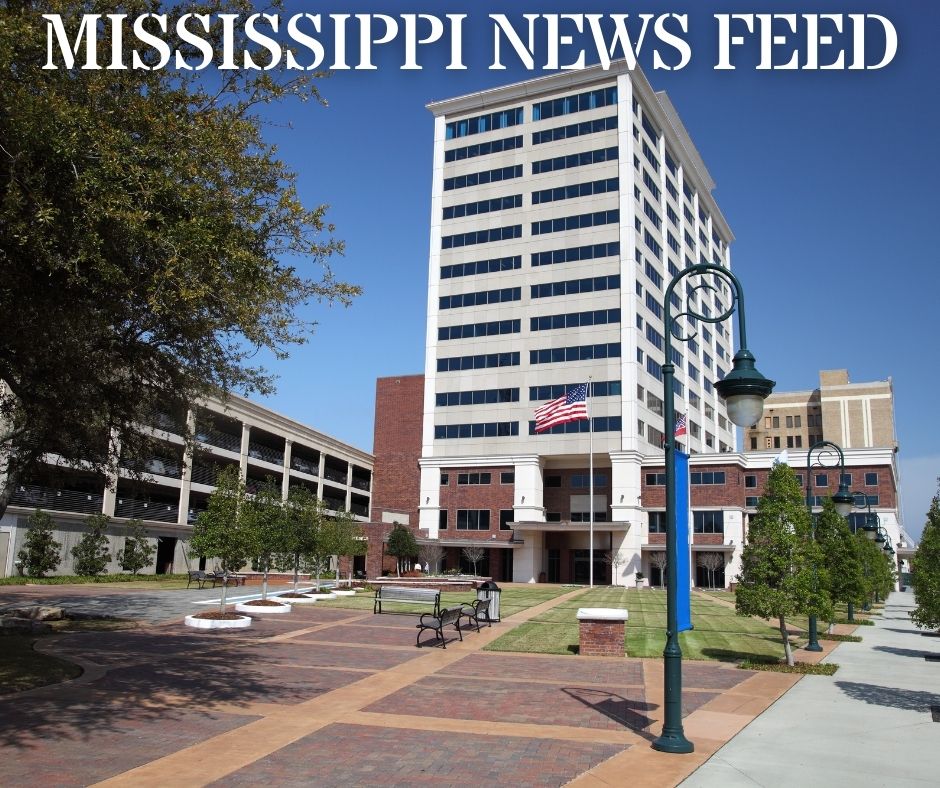Mississippi Today
At an uneasy town hall, Delta State’s president unveils ‘dramatic, upsetting’ restructuring
CLEVELAND — Last summer, record-sized hail caused millions of dollars in roof damage across Delta State University's aging campus.
Had school been in session, the regional college in the Mississippi Delta would not have had enough cash to recover and stay open, Daniel Ennis, the president, told a packed room of students, faculty, staff and community members on Monday.
“That's frightening,” he said. “That's like running a family and having no money if you blow out a tire, no money if your car breaks down.”
The stark anecdote underscored the reason for the gathering: 49 vacant positions will be left unfilled, 17 staff have been laid off and an unknown number of faculty will be next as Delta State has proposed cutting 21 of its 61 programs — majors like history, English, chemistry and accountancy— as part of a drastic restructuring. The program closures will be presented to the university's governing board, the Institutions of Higher Learning Board of Trustees.
“It's dramatic, upsetting, and I get this is shocking to many,” said Ennis, who added that there are only 238 students in those 21 programs. “So you can do the math.”
The College of Arts and Sciences will be eliminated; its remaining programs will be doled out among the still-surviving colleges. Other changes are underway: Library Services has been restructured, the Career Services, Housing and Student Life offices consolidated, and the Hamilton-White Child Development Center will be shuttered unless a committee can write a financially sustainable plan for it this summer.
The goal is not just to save money but to direct the university's funds into self-sustaining initiatives, an approach Ennis outlined in a memo that many were still digesting by the time the information-packed town hall began.

“If we fail to do these things, we're just running hand to mouth, year after year, crisis after crisis,” Ennis said. “It ends today.”
There was one piece of good news: State appropriations for the university have increased by about $1.4 million, Ennis told the room, though he isn't sure yet if the funds are flexible or must be spent on salaries.
After the meeting, the university's chief marketing officer and vice president for university relations told a Mississippi Today reporter they could provide answers to questions such as from which low-enrolled departments instructors were laid off. On Tuesday, they said it would be a personnel matter and directed Mississippi Today to submit a records request instead.
In an interview, Ennis said he envisioned renaming the two remaining colleges, potentially one could be called the “College of Humanities.” But, he acknowledged, a majority of the programs on the chopping block are traditional liberal arts degrees — the result, he said, of students voting with their feet.
“The productivity standards that I need to meet through IHL were far more important than statements made about workforce development,” Ennis said. “But I do think indirectly, in the big picture — I've been in the humanities my whole career — a generation of students have been told to go to college and get a job, and that makes things like art and music and English and history a harder sell to parents. I regret that.”
In lieu of the 21 programs, Ennis is proposing four new interdisciplinary degrees: Visual and performing arts, humanities and social science, digital media and secondary education. The university will encourage students with less than 60 credit hours in a degree that will be cut to enroll in one of these four programs, Ennis said.
Students with more than 60 credit hours will still be able to graduate with their degree, even if it is going to be cut.
That is why Ennis can't yet say the number of faculty who will be terminated. Some will be needed for “teach-outs” — the plans for the students with more than 60 credit hours. Others will stay on to teach general education. And, Ennis said, the budget for the four new degree programs, which will be created over the summer, hasn't been set. He hopes to have the programs up and running by the fall.
But, Ennis still needs to find $750,000 to cut in fiscal years 2026 and 2027 — an indication, he said, of the number of faculty that may need to go.
A room divided
The meeting Monday was the culmination of nearly a year of work, Ennis told the room. In September, he announced that Delta State must cut $11 million from its budget, a glut that resulted from years of deficit spending as the college's enrollment steadily dwindled.
When Ennis got to Cleveland, he said, Delta State had depleted its cash reserves to just 24 days.
“Just like a household that has a savings account, and one year you have a loss of income and you start spending out of your savings accounts, the challenge I faced was when I arrived here, there was no more savings account,” Ennis said.
For fiscal year 2024, the university is projected to have clawed its way to 29 days cash-on-hand, according to a powerpoint Ennis presented. But it has a long way to go before it finds the $12 million needed to achieve the minimum 90 days required by IHL — a task made all the more difficult by the financial headwinds facing higher education.
“You feel like you're on a treadmill,” Ennis said. “You save $1 million, but two years later the actual (amount) is $750,000” because of inflation.
At times, the town hall was tense and divided. When it came time for questions, some speakers commended Ennis, while others were more critical.

After Jamie Dahman, a music professor, protested Ennis' proposed changes to the marching band, a police officer walked over to Dahman, leading Ennis to tell the officer “we don't need that.” Earlier, Dahman had asked why the university and the foundation had paid hundreds of thousands for a search firm to help with replacing the dean of the arts and sciences college when, it turns out, that college is just going to be eliminated.
Christy Riddle, Delta State's chief marketing officer, said she could not answer by press time how many university funds were used for the search.
That decision had only happened a few days ago, Ennis replied. The search to replace Ellen Green, who was the subject of a faculty senate no-confidence vote last year, was canceled earlier this month.
“It was a late call, because this process was ongoing until, frankly, 10 p.m. last night,” Ennis said.
A recent graduate, Anna Schmitz, read a letter to Ennis, describing what she called unacceptable conduct by his administration, such as an instructor who learned they were out of a job earlier this year with a letter “silently and unexpectedly slid under the door of their office.” Four other instructors across multiple departments also did not have their contracts renewed.
“As of late, it seems that students have no choice but to blindly take out thousands of dollars in loans not knowing if their major will even exist next semester, and faculty members are constantly unable to confirm if they will even hold a position for the next school year,” Schmitz read.
Ennis's initial response was short.
“It pains me that I have disappointed you and your fellow students,” he said, adding her statement was courageous before concluding, “we don't agree on many things, and I will take your comments to heart.”
“What's the answer?” Someone demanded from the left side of the room, as others hesitantly clapped in support. “No response to the student?”
“Well, okay, first response,” Ennis said. “Every effort was made to personally tell individuals about their job change. … I can't speak to that individual faculty status. … I wish that we could've done this gradually, but point of fact, when you talk about people's jobs, you shouldn't do it piecemeal. I chose to give all the information today, so everybody got the maximum information as simultaneously as possible. Any other method would've disadvantaged someone.”
When he finished, the middle section of the room broke into applause.
‘None of us we're prepared for this'
Toward the end of the town hall, someone asked Ennis about the elephant in the room: What was the IHL's role in all this?
Ennis answered that IHL had charged him with fixing the university's budget when he was hired, but that wasn't the whole picture.
“I appreciate you letting me put that out there as if IHL is the ‘big bad,'” he said. “I'm owning this.”
But, Ennis also noted repeatedly throughout the town hall that he had help. An ad hoc committee of faculty, staff and administration has been meeting since last fall. It made several recommendations, spanning broad ideas such as “restructuring the Academy” to specific suggestions, like cutting $750,000 from executive and administrative salaries over two years, and adjusting the athletic department's budget by $350,000.
Ennis said he took all of the committee's recommendations into account.
The committee also proposed a retirement incentive program, which IHL approved, to save as much on salaries as possible without layoffs. Just 16 of 53 people who were eligible took the offer — less than Ennis had hoped, he said.
With all these cuts, one attendee asked how will Delta State ensure the quality of its remaining course offerings?
“That's a great question,” Ennis responded. “This is what I want to get to. We have not been able to resource the areas that are healthy in enrollment because we've been minimally resourcing all areas. We're freeing up resources that we can put toward places where they're going to be the most good.”

To determine which programs would likely survive, the university conducted an academic program review. A spreadsheet ranks all departments — the ones with the lowest score were asked to submit a report justifying their existence. Music, art and English were the lowest scoring, while the highest were nursing, alternate-route teaching and business administration.
Some faculty, after seeing the list of programs that could be eliminated, felt like their report wasn't taken into account.
“We were never involved in the conversation other than writing the reports,” said Cetin Oguz, the chair of the art department who spoke to Mississippi Today in his personal capacity and not on behalf of the university. He had joined dozens of other stunned faculty members to commiserate at a bar a few blocks from campus called Hey Joe's.
Over pints, some were realizing what IHL had hired Ennis to do. Their focus was shifting from the financial mess that Ennis wasn't responsible for to the problems they felt he was creating: Decisions they believed could have been made sooner, or with more input, and more transparency.
Specifically, multiple faculty said they didn't believe the ad hoc meetings were open to attendees, and they were frustrated by the sparseness of the meeting minutes. Ennis told Mississippi Today the meetings were open.
Oguz, who was involved in an employment lawsuit the university settled last year, said many of Ennis' changes have been good. Oguz said he can't remember the last time Delta State asked him to review his department's productivity, and he's taught at the university for 21 years.
But it's been far from easy.
“I just recruited students,” Oguz said. “They said, I just refused a scholarship from the University of Southern Miss to come to Delta State. What do you want me to do?' I don't have any answers for them. None of us were prepared for this.”
This article first appeared on Mississippi Today and is republished here under a Creative Commons license.
Mississippi Today
On this day in 1957


JULY 6, 1957

Althea Gibson became the first African American to win the women's singles title at Wimbledon and became the top female tennis player in the world. Just six years earlier, she had become the first black player to compete at Wimbledon.
Born in South Carolina, she grew up in Harlem, where she loved table tennis. A local musician invited her to play tennis, and she became so talented that a year later, she won a local tournament sponsored by the American Tennis Association (formed by African Americans), later winning 12 ATA titles in just 13 years.
Despite her talent, much of the tennis world remained closed off to her. The breakthrough came in 1950 when tennis legend Alice Marble lambasted the sport for barring Gibson from the world's best tournaments. The tennis world opened its doors, and Gibson became a Top 10 player in the U.S.
In 1956, she won the French Open. After winning both the women's singles and doubles at Wimbledon in 1957, she was welcomed with a ticker tape parade in New York City. She went on to win 56 singles and doubles championships before turning pro in 1959.
Although she declared that she never considered herself a crusader, there is no question that she opened the doors for many others. She even tried golf, becoming the first black woman to compete on the pro tour.
After she retired, she was inducted in 1971 into the International Tennis Hall of Fame. She died in 2003 at the age of 77. In 2013, the U.S. Postal Service issued a stamp in her honor. Venus Williams said Gibson has been an inspiration to her and her sister, Serena.
This article first appeared on Mississippi Today and is republished here under a Creative Commons license.
Did you miss our previous article…
https://www.biloxinewsevents.com/?p=372977
Mississippi Today
As heat rises, inmates and staff swelter in Mississippi’s prisons
As of Friday, five of the six locations where Mississippi's prisons are located are under a National Weather Service heat advisory.
And the Mississippi Department of Corrections has no clear timeline as to when it will install air conditioning to bring relief to inmates and staff.
“We are continuing to explore our options to provide air conditioning where possible; however, there is no timetable for that installation at this time,” MDOC spokesperson Kate Head wrote in an email.
One woman incarcerated at the women's prison at the Central Mississippi Correctional Facility in Pearl said relief from the heat is hard to come by and the temperatures inside are worse than outside without any shade or trees. The woman asked not to be named for fear of retaliation.
“It's actually worse (in) here,” she said Tuesday. “The heat just hits you in the face.”
The heat index, also known as what temperature feels like on the body, takes into account humidity and air temperature. Friday's advisory was said to expect index temperatures up to 110.
According to the Centers for Disease Control and Prevention, people who are at an increased risk of heat-related illnesses include those without access to air conditioning, those over the age of 65 and people with chronic conditions – populations that include incarcerated people.
Last year was the incarcerated woman's first summer at the prison, and she witnessed people pass out or experience seizures because of the heat.
Head, the MDOC spokesperson, wrote in an email that the department is taking steps to mitigate the heat by providing incarcerated people with water, ice and fans.

This is similar to what has been done in previous years, but some incarcerated people have said that distribution of ice isn't always regular or enough to support hundreds of people and that fans move hot air around. MDOC did not respond to these concerns Friday.
Air conditioning installation has been completed at the women's prison at CMCF in the church, school and dining areas, the incarcerated woman said. Several weeks ago it was completed in her housing zone, she said, but the AC there has not been turned on.
Tuesday evening, the prison superintendent visited the building where the incarcerated woman lives and told residents the air conditioning would not be turned on for the foreseeable future because it requires a part that is on backorder, the woman said.
The woman has also seen how three emotional support dogs trained by seminary students are moved to air conditioned areas and provided pools of water to stay cool. She doesn't understand how the animals get access to the relief but she and the other women don't.

“We get the short end of the stick on everything,” she said, in reference to how the men at CMCF already have AC and the dogs in the women's prison get access to it.
MDOC did not respond to questions about the air conditioning and the dogs' access to it.
Last year as air conditioning was installed at three-fourths of the Mississippi State Penitentiary at Parchman, Commissioner Burl Cain estimated that by sometime in 2025, AC would be coming Parchman's Unit 29, South Mississippi Correctional Institute in Leakesville and other facilities, so long as funding was available to support those upgrades.
“It just takes a good while to get it all done,” he said in an April 2023 interview with Missisisppi Today. “That's just the way the funding is.”
At Parchman, the heat index was above 130 degrees – within the extreme danger category where a person's risk of heat-related illness is likely – for 25 of the past 72 hours, according to the National Weather Service records.
On four separate instances Wednesday afternoon, the heat index reached 185 at Parchman, according to weather data.
Pictures from Parchman's Unit 29, which doesn't have air conditioning, shows how men have secured 8-inch fans purchased from the commissary to the bars of their cells and placed their mattress on the floor beneath the fan, which some have told advocates is how they get relief from the heat.
The majority of Parchman has had air conditioning since last summer, but Unit 29 is part of the group of prisons that are expected to get AC sometime in the future.
At all prisons, an 8-inch fan is available to buy from the commissary for $29.95, which is among one of the most expensive on the prison's commissary list compiled by The Appeal.
Even if an incarcerated person has a job, Mississippi prison industry jobs can pay between 20 cents and $1.30 an hour, which falls within an estimated national average calculated by the Prison Policy Initiative. The group also estimated regular prison jobs nationwide have an estimated range of 14 cents and 63 cents an hour.
Privately operated Eastern Mississippi Correctional Facility has AC including in its housing units, but family members told advocates that since the end of May, the air conditioning has not been functional.
The maximum daily temperatures in Meridian, where the prison is located, have been above 90 degrees since the end of May, according to the National Weather Service.
Meridian is also under a heat advisory, and within the past three days, the highest heat index was 107 degrees – 95 degrees at 75% humidity, which is in the danger category for heat-related illnesses.
Management and Training Corp. spokesperson Emily Lawhead said technicians have diagnosed problems with air conditioning units and will install new units when they arrive.
“We're working hard to get all AC units back online as soon as possible,” she wrote in an email.
In the meantime, Lawson said cold water and fans are available, and Gatorade is provided to staff and incarcerated people for them to stay hydrated. Swamp coolers are cooling the air in areas where AC units are waiting to be repaired, she said Friday.
Heat in prison is a national issue that Families Against Mandatory Minimums, which represents incarcerated people and their families, and One Voice United, a group representing corrections staff, have teamed up to address.
The Safer Prisons, Safer Communities campaign is highlighting a nationwide crisis through overcrowding, understaffing and deteriorating conditions that make prisons unconducive to rehabilitation and create poor conditions for incarcerated people, prison staff, families and communities.
Andy Potter, executive director of One Voice United and a former Michigan corrections officer, recognizes prison infrastructure can be old and it can be expensive to install air conditioning.
But he said it's not enough for incarcerated people and the corrections staff to rely on fans, water bottles and Gatorade to stay cool. The incarcerated and staff do not have the freedom or ability to seek relief in a similar way as those not in a prison system can do, Potter said.
Daniel Landsman, vice president of policy for FAMM, said air conditioning can help decrease incidents of violence and fatalities, which research has found increases with heat.
“Heat is just going to make all the things we are experiencing in our prison system worse,” he said.
This article first appeared on Mississippi Today and is republished here under a Creative Commons license.
Mississippi Today
On this day in 1827


JULY 5, 1827

A day after those enslaved were freed in the state of New York, 4,000 Black Americans marched along Broadway through downtown streets with a grand marshal carrying a drawn sword. They arrived at the African Zion Church, where abolitionist leader William Hamilton said, “This day we stand redeemed from a bitter thralldom.”
Celebrations took place as far away as Boston and Philadelphia. In New York's capital, Nathaniel Paul, pastor of the First African Baptist Society, declared, “We look forward … (to) when this foul stain will be entirely erased, and this, the worst of evils, will be forever done away … God who has made of one blood all nations of men, and who is said to be no respecter of persons, has so decreed; I therefore have no hesitation in declaring this sacred place, that not only throughout the United States of America, but throughout every part of the habitable world where slavery exists, it will be abolished.”
Among those freed by this act? Sojourner Truth, who was born into slavery and had escaped to freedom just a year earlier. The Fifth of July is still recognized and celebrated in New York City.
This article first appeared on Mississippi Today and is republished here under a Creative Commons license.
Did you miss our previous article…
https://www.biloxinewsevents.com/?p=372793
-
Mississippi News1 day ago
Two inmates escape from Mississippi detention center
-
Our Mississippi Home6 days ago
Recipes to Get You Ready for July 4th
-
Our Mississippi Home7 days ago
Marine Fisheries Internships Pave Way for Future USM Scientists
-
Local News6 days ago
Hurricane Beryl strengthens into a Category 4 storm as it nears the southeast Caribbean
-
Mississippi News3 days ago
Case hits close to home in Columbus
-
Local News6 days ago
Mississippi sets new laws on Medicaid during pregnancy, school funding, inheritance and alcohol
-
Local News7 days ago
IRS announces tax relief for taxpayers impacted by severe storms, straight-line winds, tornadoes, and flooding in Mississippi
-
Local News7 days ago
Diamondhead launches new “community read” program

































